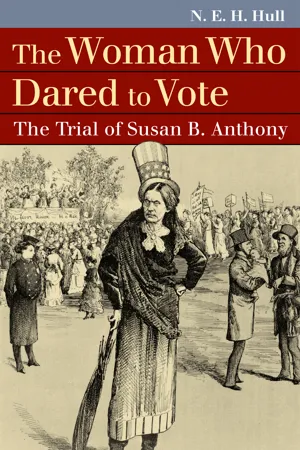
- 262 pages
- English
- ePUB (mobile friendly)
- Available on iOS & Android
About this book
Just as the polls opened on November 5, 1872, Susan B. Anthony arrived and filled out her "ticket" for the various candidates. But before it could be placed in the ballot box, a poll watcher objected, claiming her action violated the laws of New York and the state constitution. Anthony vehemently protested that as a citizen of the United States and the state of New York she was entitled to vote under the Fourteenth Amendment. The poll watchers gave in and allowed Anthony to deposit her ballots. Anthony was arrested, charged with a federal crime, and tried in court.
Primarily represented within document collections and broader accounts of the fight for woman suffrage, Anthony's controversial trial—as a landmark narrative in the annals of American law—remains a relatively neglected subject. N. E. H. Hull provides the first book-length engagement with the legal dimensions of that narrative and in the process illuminates the laws, politics, and personalities at the heart of the trial and its outcome.
Hull summarizes the woman suffrage movement in the post-Civil War era, reveals its betrayal by former allies in the abolitionist movement, and describes its fall into disarray. She then chronicles Anthony's vote, arrest, and preliminary hearings, as well as the legal and public relations maneuvering in the run-up to the trial. She captures the drama created by Anthony, her attorneys, the politically ambitious prosecutor, and presiding judge—and Supreme Court justice—Ward Hunt, who argued emphatically against Anthony's interpretation of the Reconstruction Amendments as the source of her voting rights. She then tracks further relevant developments in the trial's aftermath—including Minor v. Happersett, another key case for the voting rights of women—and follows the major players through the eventual passage of the Nineteenth (or "Susan B. Anthony") Amendment.
Hull's concise and readable guide reveals a story of courage and despair, of sisterhood and rivalry, of high purpose and low politics. It also underscores for all of us how Anthony's act of civil disobedience remains essential to our understanding of both constitutional and women's history—and why it all matters.
Frequently asked questions
- Essential is ideal for learners and professionals who enjoy exploring a wide range of subjects. Access the Essential Library with 800,000+ trusted titles and best-sellers across business, personal growth, and the humanities. Includes unlimited reading time and Standard Read Aloud voice.
- Complete: Perfect for advanced learners and researchers needing full, unrestricted access. Unlock 1.4M+ books across hundreds of subjects, including academic and specialized titles. The Complete Plan also includes advanced features like Premium Read Aloud and Research Assistant.
Please note we cannot support devices running on iOS 13 and Android 7 or earlier. Learn more about using the app.
Information
Table of contents
- Front Cover
- Half Title
- Series Page
- Title Page
- Copyright Page
- Dedication
- Table of Contents
- Editors’ Preface
- Acknowelegement
- Introduction
- Prologue
- 1. “We Represent Fifteen Million People”: Summer 1865–Fall 1869
- 2. “Entitled to the Unabridged Exercise of Privileges and Immunities”: Fall 1869–Fall 1872
- 3. “I Have Been & Gone & Done It!!”: Fall 1872–Winter 1873
- 4. “There Is No Time Now to Indulge in Personal Enmity”: January 1873–May 1873
- 5. “On the Part of the Government, There Is No Question”: June 17–18, 1873
- 6. “Had the Defendant, Being a Female, the Right to Vote?”: June 18–19, 1873
- 7. “Selfish Male Tyranny”: June 20, 1873–March 29, 1875
- Postscript: To the Nineteenth Amendment
- Chronology
- Bibliographical Essay
- Index
- Back Cover